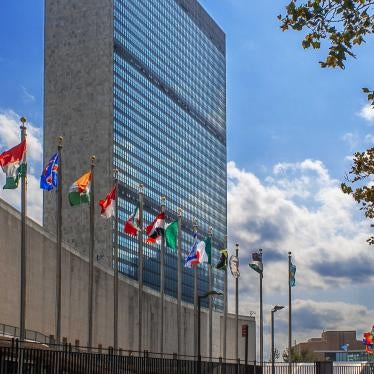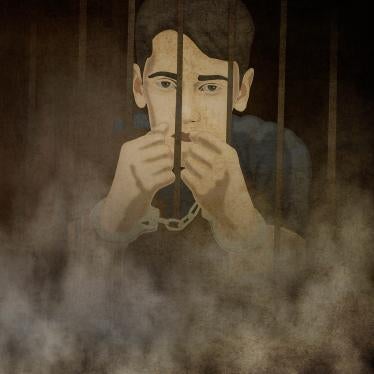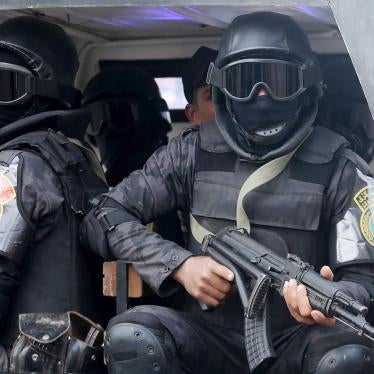(Beirut) – Egyptian authorities should urgently release the autopsy report and investigate the suspicious death of economist Ayman Hadhoud, Human Rights Watch said today.
Hadhoud was forcibly disappeared on February 5 or 6, 2022, and died in the custody of security authorities on March 5, according to his death certificate. The authorities did not inform his family of his death until April 9, more than a month later. An autopsy ordered by the public prosecution took place on April 12 but without independent observers, according to friends and family. Its results have not been released to his family.
The autopsy analysis and photos should be made available for review by independent forensic experts to determine if Hadhoud was subjected to torture or ill-treatment, Human Rights Watch said.
“Ayman Hadhoud’s suspicious death in custody requires a fully independent, impartial, and thorough investigation, starting with an independent review of the autopsy results,” said Joe Stork, deputy Middle East and North Africa director at Human Rights Watch. “Clearly the Egyptian authorities committed grave abuses against Hadhoud by subjecting him to a prolonged enforced disappearance.”
Human Rights Watch has documented a pattern of systematic torture of detainees in secret National Security Agency offices and police stations. Torture frequently occurs in cases of enforced disappearances, which are prohibited under international law in all circumstances and can be prosecuted as a crime against humanity in certain circumstances.
Human Rights Watch spoke with three people familiar with Hadhoud’s case – a brother, a close friend, and Hadhoud’s lawyer.
Hadhoud, a former economic advisor to Egypt’s Reform and Development Party, was last seen by a relative on the evening of February 5. His family received no news of him until February 8, when an officer came to the family home and requested the presence of a relative at the al-Amiriya Police Station, a National Security Agency (NSA) facility. There, an officer questioned the relative about Hadhoud’s work and informed him that Hadhoud was in NSA custody but did not allow him to see Hadhoud. Days later, when relatives tried to visit Hadhoud at the police station, officers denied he was there.
On February 8, Hadoud’s friend asked Mohamed Anwar al-Sadat, the head of the Reform and Development Party, to help secure Hadhoud’s release. The family believed they had a better chance that he would be released if they kept his disappearance private.
On February 18, an informal source informed the family that the authorities had transferred Hadhoud to the Abbasiya Psychiatric Hospital under a 45-day supervisory hold.
On February 23, when two of Hadhoud’s associates visited the hospital to confirm his presence, the hospital official confirmed he was being held in the hospital’s forensic medicine department and assured them he was in good health. The manager told them they needed the Public Prosecution’s permission to visit Hadhoud because the forensic medicine department is under police and Interior Ministry control, and because Hadhoud was accused in a criminal case.
When the family inquired at the Public Prosecution for information and permission to visit Hadhoud, prosecution officials denied any knowledge of him and claimed there was no case against him. The hospital also later denied that Hadhoud was there.
Throughout March, friends and relatives attempted to visit Hadhoud at least 15 times at the hospital but their requests were denied.
On March 23, Hadhoud’s friend informally contacted a hospital staff member. On April 4, the staff member informed the friend that “If the person you are asking about has this name – Ayman Mohamed Ali Hadhoud – he has been dead since a month ago.” The friend told Human Rights Watch that he was “completely shocked,” saying Hadhoud was a “very healthy 48-year-old.”
On April 7, the friend announced Hadhoud’s disappearance on social media. That day a family member visited both the Public Prosecution Office and Abbasiya Hospital. Officials in both places denied that Hadhoud was there or that they had any information about his well-being or whereabouts. On April 7, the hospital official who had confirmed on February 23 that Hadhoud had been admitted to the hospital told the family member, “He is not here, he never entered the hospital, he is not here alive or dead.”
On April 9, after news of Hadhoud’s disappearance spread, a Nasr City Police Station officer called the family and informed them of Hadhoud’s death.
When the family went to the Abbasiya Psychiatric Hospital on April 9, one brother viewed his body. He told Human Rights Watch that it had “many bruises all over his face and had a cracked skull.” After he took photos of the body a member of the hospital staff asked him to delete them.
The brother told Human Rights Watch that he “rejects that Ayman died in a natural way.” Hadhoud’s lawyer told Human Rights Watch that there is “criminal suspicion” surrounding his death.
When Hadhoud’s family received the burial permit issued by the Public Prosecution, they found it specified that Hadhoud should be buried in a charity cemetery for unidentified bodies. The family’s request for a new permit took many hours. Before the second burial permit was issued, prosecutors interrogated two of Hadhoud’s brothers for over two hours about Hadhoud’s mental health, according to a friend and family member.
The Public Prosecution ordered an autopsy on April 10, only after news of Hadhoud’s death had spread widely.
The autopsy took place at the Zeinhom morgue on April 12. The doctor conducting the autopsy rejected requests for independent observers to monitor the autopsy and performed it without supervision, said friends and family who went to the building where the autopsy took place.
The death certificate, which Human Rights Watch viewed, states the cause of death as “under investigation” and the date of death as March 5.
Human Rights Watch sent three photos of Hadhoud’s body, taken after the autopsy, to two independent forensic experts. The first expert said that he could not come to a definitive conclusion about whether the marks on Hadhoud’s face and arms indicated torture or ill-treatment or were a result of decomposition. The expert said that it would be usual for a trained person conducting an autopsy to use a saw rather than crack the skull to examine the brain. The second forensic investigator said that “It is hard for us to make a strong comment, particularly in light of when [the photos] were taken and the quality.”
On April 11, the Public Prosecution summoned one of Hadhoud’s brothers for questioning after he spoke to media about the disappearance, a family member said.
On April 10, the Interior Ministry released a statement denying that Hadhoud had been forcibly disappeared, claiming that “he was placed in a psychiatric hospital based on the decision of the Public Prosecution” after he attempted to break into an apartment in Zamalek on February 6. On April 12, the Public Prosecution statement claimed that there is “no criminal suspicion in his death” and acknowledged that he was arrested on February 6.
These statements contradict the Public Prosecution’s denials to Hadhoud’s family throughout February and March that he was in their custody or faced any criminal proceedings. They also fail to acknowledge or explain the month-long delay between the alleged date of Hadhoud’s death and the date when security officials officially informed his family of his death.
In the event of a patient’s death, Egypt’s psychiatric patient care law requires authorities to inform the family within 24 hours.
The Public Prosecution’s April 12 statement mentions two possible causes of death: a sharp drop in blood circulation and cardiac arrest, and a Covid-19 infection. It also states that Hadhoud was in a state of delirium at the time of arrest. None of this information was provided to Hadhoud’s family, despite their persistent efforts to obtain details about his condition and whereabouts.
The statement also claims that the Public Prosecution “took publishing and photographing procedures” of Hadhoud’s body. The results of these procedures – the autopsy – should be immediately released to Hadhoud’s family.
On April 18, the Public Prosecution announced it had ended the investigation into Hadhoud’s death after receiving the Forensic Medicine Authority’s determination that his death was a result of “a chronic heart condition” and stated that his body was free of “any injuries that indicate criminal violence or resistance.” Hadhoud’s lawyer told Human Rights Watch that the family is submitting a formal request to the prosecution for the autopsy report.
Egypt has ratified international treaties, including the African Charter on Human and Peoples’ Rights, the International Covenant on Civil and Political Rights, and the Convention against Torture, which oblige the government to investigate, prosecute, punish, and provide remedies and reparation for the crimes of torture, ill-treatment, and enforced disappearances.
“Hadhoud’s family and associates – indeed, all Egyptians – deserve a full inquiry into what happened to Ayman Hadhoud during those long weeks of his disappearance,” Stork said. “Those responsible for criminal wrongdoing should be appropriately prosecuted.








